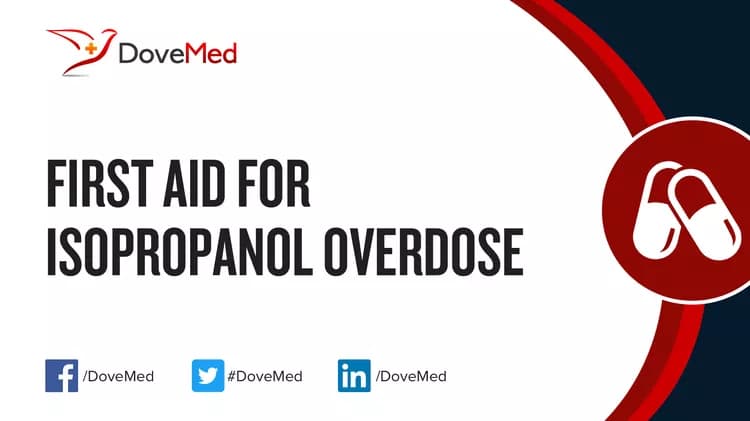What is Isopropanol Overdose?
- Isopropanol is a colorless solvent having various industrial and domestic applications. It has a characteristic alcohol odor
- Isopropanol forms a component of paint thinners, rubbing alcohol (alcohol swabs), cleaning liquids, cosmetics (perfumes), and certain medications
- Isopropanol Overdose is the accidental or intentional ingestion of solutions containing isopropanol. In general, the chemical is not meant for consumption
- The condition is diagnosed based upon the clinical history, combination of signs and symptoms, and additional tests (that may include, in some cases, radiological studies and laboratory tests)
What are the Causes of Isopropanol Overdose?
- Isopropanol Overdose is caused by the intake of isopropanol containing solutions
- Isopropanol can be inhaled, swallowed, accidentally fall in the eye, or affect the skin
- This intake could be accidental, or in some cases intentional, to bring self-harm
Note: The drug can interact with other prescribed or non-prescribed medications in the body. Such interactions may enhance the therapeutic effects of the drug or other medications being taken, resulting in undesired side effects (such as an overdose).
What are the Signs and Symptoms of Isopropanol Overdose?
The signs and symptoms of Isopropanol Overdose can vary from one individual to another. It may be mild in some and severe in others. The signs and symptoms of Isopropanol Overdose may include:
- Stomach or abdominal pain
- Throat pain, slurred speech
- Reduced body temperature
- Low blood pressure and blood sugar
- Increased heart-rate, slow breathing rate
- Nausea, vomiting
- Dizziness, confusion
- Skin pain, reddishness of the skin
- Headache
- Urinary difficulty
- Poor reflexes, inability to coordinate movement
- Loss of consciousness
- Coma
Note: The primary method of exposure is swallowing the liquid, followed by skin contact.
How is First Aid administered for Isopropanol Overdose?
First Aid tips for Isopropanol Overdose:
- Call 911 (or your local emergency help number) immediately
- Call the Poison Control Center at 1-800-222-1222 (or your local poison control center) for further instructions
- Provide them with information such as the compound taken, quantity and time of ingestion, age, weight and general health status of affected individual
- Unless advised suitably, DO NOT induce vomiting
- In case of symptoms that indicate difficulty in swallowing including decreased alertness, do not give anything by way of mouth
- In case isopropanol-based liquid or chemical is swallowed, and if advised accordingly, give the affected individual milk or water to drink immediately
- Confirm that the airways are protected; also, ensure breathing and the presence of pulse
- If eye exposure has occurred, then wash the eye thoroughly with copious amounts of water (for about 15 minutes)
- Take individual to emergency room (ER) for further treatment
- Always try to take the bottle/container containing the liquid to the ER
The emergency medical health professional might perform the following steps towards treating the condition:
- Medically manage symptoms, such as abnormal heart rate and breathing difficulty
- Provide breathing support, if necessary
- Gastric lavage for elimination of drug from the stomach (irrigation using special solutions)
- Administer fluids by an intravenous drip line
- Wash skin and eyes repeatedly and thoroughly (irrigation), to eliminate any remaining hazardous compound
- In rare cases, urinary dialysis may be undertaken
Who should administer First Aid for Isopropanol Overdose?
First aid for Isopropanol Overdose is administered by healthcare professionals.
- The individual who overdosed, or someone near, should call 911 for emergency assistance (or the local emergency number)
- They should also call the poison control center at 1-800-222-1222 (or the local poison control center) and follow instructions
What is the Prognosis of Isopropanol Overdose?
- The prognosis of Isopropanol Overdose is dependent on the amount of drug consumed, time between overdose and treatment, as well as general health status of the patient
- Consuming tiny amounts would result in alcohol-like side effects and the recovery is reported to be good
- An intake of substantial amounts of isopropanol can result in respiratory difficulties, reduced kidney function (renal failure), GI bleeding, potential damage to the brain, and coma
In general, overdoses are common situations in the emergency departments. A majority of the cases are often not fatal, when appropriate treatment is given.
How can Isopropanol Overdose be Prevented?
Isopropanol Overdose can be prevented by:
- Always taking the right dose of medication at recommended times
- Avoiding drugs that might interact with isopropanol
- Refrain from self-medication
- Keeping medications out of reach of children in child-proof containers
- Keeping common cleaning solutions and isopropanol containing chemicals out of reach of children
It is important to give your healthcare provider a complete list of prescription and non-prescription medications that are being currently taken. This will help them in assessing the possible drug interactions within various medications and help avoid/prevent accidental or unintentional toxic drug effects.
What are certain Crucial Steps to be followed?
- Call 911 (or your local emergency number) for emergency assistance, if symptoms are life-threatening
- Call Poison Control Center at 1-800-222-1222 (or the local poison control center) and follow the recommend steps
- It would be helpful if the following information is readily available:
- Type, dosage and time of administration of medication
- Age and weight of the individual
- And, the overall health status of the individual
Related Articles
Test Your Knowledge
Asked by users
Related Centers
Related Specialties
Related Physicians
Related Procedures
Related Resources
Join DoveHubs
and connect with fellow professionals


0 Comments
Please log in to post a comment.